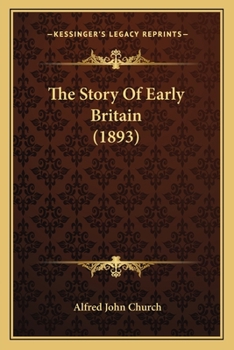The Story Of Early Britain (1893)
Select Format
Select Condition 
Book Overview
The Story of Early Britain, written by Alfred John Church and first published in 1893, is a comprehensive account of the early history of the British Isles. The book covers the period from the arrival of the Celts in Britain to the Norman Conquest in 1066. Church begins by describing the various tribes and peoples that inhabited Britain before the arrival of the Celts, including the Picts and the Britons. He then goes on to discuss the arrival of the Celts, their society and culture, and their interactions with the Romans.The book also covers the Anglo-Saxon invasion of Britain, the establishment of the kingdoms of Wessex, Mercia, and Northumbria, and the rise of the Viking raids. Church provides detailed accounts of the battles and conflicts that shaped early British history, as well as the social and cultural developments that took place during this time.Throughout the book, Church draws on a wide range of sources, including historical documents, archaeological evidence, and literary works. He also provides insights into the religious beliefs and practices of the early Britons, including the Druids.Overall, The Story of Early Britain is a fascinating and informative account of a pivotal period in British history. It is a must-read for anyone interested in the origins of the British people and the development of their culture and society.This scarce antiquarian book is a facsimile reprint of the old original and may contain some imperfections such as library marks and notations. Because we believe this work is culturally important, we have made it available as part of our commitment for protecting, preserving, and promoting the world's literature in affordable, high quality, modern editions, that are true to their original work.
Format:Paperback
Language:English
ISBN:1165936089
ISBN13:9781165936083
Release Date:September 2010
Publisher:Kessinger Publishing
Length:410 Pages
Weight:1.20 lbs.
Dimensions:0.8" x 6.0" x 9.0"
Customer Reviews
0 rating





